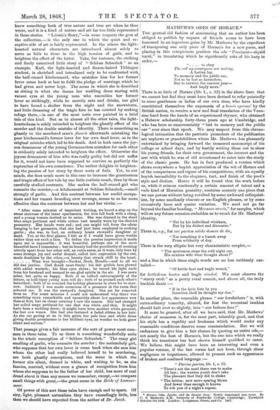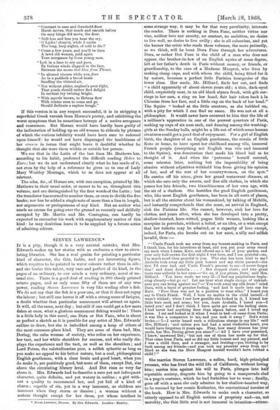MATHEWS'S ODES OF HORACE.* in these stories. " Ldonie's Story,"—in
some respects the gem of THE genteel old fashion of announcing that an author has been obliged to publish by request of friends seems to have been honoured in an ingenious guise by Mr. Mathews by the expedient of transposing one only piece of Horace's for a new poem, and serve as foils to those in the high tension of guilt, and to placing in this conspicuous position tha ode " Poscimur—siquid ' translating which he significantly asks of his harp in heighten the effect of the latter. Take, for instance, the striking vacm,
" . . . to obey The call my countrymen are making, A Latian lay, To memory and the public ear, Not to be lost as heretofore, But to survive the current year— And haply more."
There is so little of Horace (lib. 1., c. 32) in the above lines; that we cannot but feel they must have been devised to refer pointedly to some gentlemen or ladies of our own time, who have kindly constituted themselves the exponents of a besoin eprouve by the British nation, to receive a new and final translation of the Venn- sine bard from the hands of an experienced rhymer, who obtained a Hebrew scholarship forty-three years ago at Cambridge, and who has been so unaccountably " lost to memory and the public ear" ever since that epoch. We may suspect from this chrono- logical intimation that the patriotic promoters of the publication are nephews or grandchildren whom Mr. Mathews has pleasantly entertained by bringing forward the treasured manuscript of his college or school days, and by hastily writing them out to show his young friends, for their own government, the interest and the zest with which he was of old accustomed to enter into the study of the classic poets. He has in fact produced a version which shows everywhere a boyish appreciation of the wit of Horace and of the compactness and vigour of his compositions, with an equally boyish insensibility to the elegance, tact, and finish of the poet's style and diction. Hence it will be found that the work before us, while it evinces continually a certain amount of talent and a rude kind of Horatian geniality, contains scarcely one piece that we can peruse without being revolted by some awkward colloquial- ism, by some needlessly obscure or un-English phrases, or by some excessively loose and quaint variation. We need not go fax beyond the familiar heading, " /liecxnas atavis," for samples, which will on any future occasion embolden us to vouch for Mr. Mathews' identity, "Not by his individual whiskers, But by his dialect and discourse." There is, e.g., for nec parkin solido demere de die, "Nor trenching it a hunch away From solidarity of day.
There is the very elliptic but very characteristic couplet,-
" The sportsman stops the cold night out, His anxious wife what thought about ?"
ruthlessly cur- and a line in which three single words are no less
tailed— "Of kettle beat and bugle wound,"
for kettledrum beaten and bugle winded. We must observe the "starry croft" as a pretty rural conceit, and above all, the truly buckish finale :-
" If in the lyric lists by you
Insertion shall be thought my due."
In another place, the venerable phrase " our forefathers " is, with extraordinary temerity, altered, for fear the accentual iambics should halt ever so slightly, into " our fathers fore !"
It must be granted, after all we have said, that Mr. Mathews' choice of measures is, for the most part, tolerably good, and that his style has a rapidity and freshness which would under any reasonable conditions deserve some commendation. But we will endeavour to give him a fair chance by quoting an entire ode,— not nearly the best of Horace's, but the one into which we really think his translator has best shown himself qualified to enter. We believe this might have been an interesting and even a popular version, if the last verses had not been, through sheer negligence or impatience, allowed to present such an appearance of broken and confused language :—
"Parchisjunctas, lib. 1, c. 25. " There's not the need there was to make All fast: the wanton youth don't take The pleasure that they did to shake "The lattice: now more sparing blows And fewer than enough it knows To rob you of a night's repose.
• Horace: Oda, Epodes. and the Secular Song. Newly translated into verse. By C. S. Mathews, A.M., formerly of Pembroke College, Cambridge ; Tyrwhittis Scholar for 1824. London : Longman, Green, and Co. 1867.
" Constant to case and threshold floor Harsh moves, that much and smooth before On easy hinge did move, the door.
" Still less and less you bear the cry, 0 Lydia! aleep'st, while I outlie The long, long nights, of cold to die ?'
"Come a few years, and you'll be then A lewd old woman, paid again Your arrogance by loose young men.
"Left in a lane to cry and pace, By furious winds slapped in the face, Between the moons that blow from Thrace.
"In ulcered viscera while you flare As in a paddock a brood-mare Snuffing the vitiated air, " Not without plaint, neglect's poor right, That youth should rather find delight In verdant ivy twining bright.
"With myrtle brown, to Hebrus flow With winter seen to come and go Should dedicate a sapless bough."
If this version is in any respect successful, it is in stripping a superficial Greek varnish from Horace's poetry, and exhibiting the worst symptoms that he sometimes betrays of a native arrogance and coarseness. But Horace would have hardly been guilty of
the indiscretion of holding up an old woman to ridicule by phrases a which the curious infelicity would have been sure to redound 'upon himself ; he would not have disparaged the healthiness of 'her viscera in terms that might leave it doubtful whether he -thought that she wore them within or outside her person.
We see that in the Latin of the last lines Mr. Mathews has, according to his habit, preferred the difficult reading Hebro to Euro ; but we do not understand clearly what he has made of it, not even by the help of a reference he gives us to one of Lady Mary Wortley Montagu, which to us does not appear at all
relevant.
The odes, &c., of Horace are, with one exception, printed by Mr. Mathews in their usual order, or meant to be so, throughout this volume, and are distinguished by the first words of the Latin ; but the translator has scorned to number them, or even to divide the five books; nor has he added a single note of more than a line in length, nor arguments or prolegomena of any kind. But an author who needs no excuse for going over the ground so recently and skilfully occupied by Mr. Martin and Mr. Conington, can hardly be expected to encumber his work with supplementary matter of this kind : he may doubtless leave it to be supplied by a future series IA admiring editors.



































 Previous page
Previous page